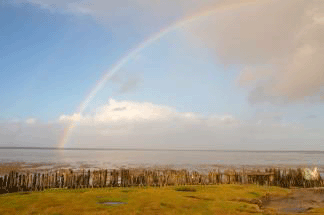An audio sermon by Rev’d Dr Vicki Balabanski
for Planet Earth Sunday, 6 September 2015.
CLICK HERE TO PLAY AUDIO
(The audio will open in a new window so you can follow the notes here while you listen)
What is the Season of Creation?
Thinking about God as Creator is not the same thing as creationism.
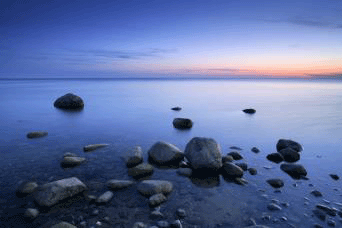
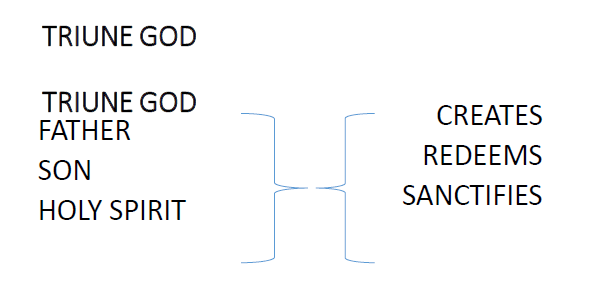 John 1:1 In the beginning was the Word, and the Word was with God, and the Word was God.
John 1:1 In the beginning was the Word, and the Word was with God, and the Word was God.
2 He was in the beginning with God.
3 All things came into being through him, and without him not one thing came into being.
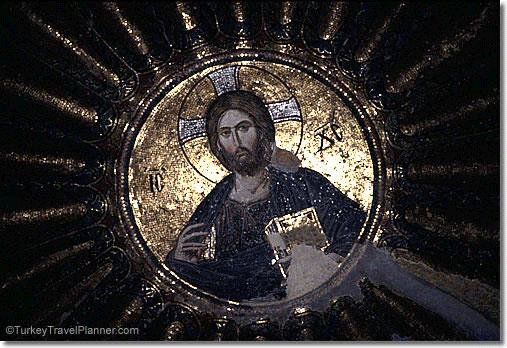
Everyone has places
where they experience
God’s transcendence.
Psalm 8:3
When I look at the heavens, the work of your fingers, the moon and the stars that you have established, what are human beings that you are mindful of them, mortals that you care for them?
Immanence
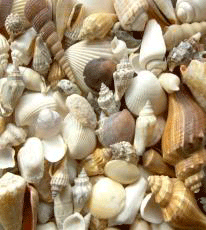 How does the Bible speak of God’s presence, God’s immanence?
How does the Bible speak of God’s presence, God’s immanence?
•In Jerusalem/in Zion
Sing praises to the LORD, who dwells in Zion! Ps 9:11
•In the Temple/place of worship
When Solomon had ended his prayer, fire came down from heaven and consumed the burnt offering and the sacrifices, and the glory of the LORD filled the temple. 2Ch 7:1
•The whole earth/ creation ‘the God of the whole earth he is called’. Isa 54:5
•Where believers gather ‘For where two or three are gathered in my name, there am I in the midst of them.“ Mt 18:20
•In Jesus: “Emmanuel,” which means, “God is with us.” Mt 1:23
Psalm 33:5-9
…the earth is full of the steadfast love of the LORD.
6 By the word of the LORD the heavens were made, and all their host by the breath of his mouth.
7 He gathered the waters of the sea as in a bottle; he put the deeps in storehouses.
8 Let all the earth fear the LORD; let all the inhabitants of the world stand in awe of him.
9 For he spoke, and it came to be; he commanded, and it stood firm
A Paradox
We need the natural world to glimpse the One who transcends the natural world.
•Wisdom 13:5 For from the greatness and the beauty of created things their original author, by analogy, is seen.
Paul’s view too
•Romans 1:20 Ever since the creation of the world God’s eternal power and divine nature, invisible though they are, have been understood and seen through the things he has made.
•For Paul, this is an indictment on humanity – we default into worshipping the creation rather than the Creator.
We need creation (=nature) to grasp something of God’s transcendence and God’s immanence
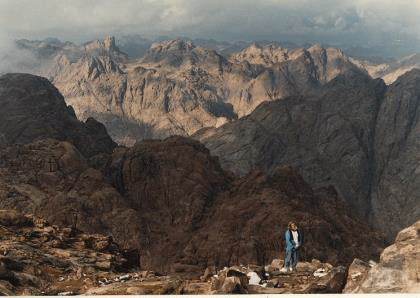 Mt Sinai
Mt Sinai
N.T. Wright ‘The Outer Story: God and Creation.’
•‘The story of creator and cosmos is in fact everywhere presupposed… There is one God from whom all things come, to whom we owe our allegiance, our very selves. ‘From him and through him and to him are all things.’
•A two-fold story: the creator God made a world with a purpose, and entrusted that purpose to humans. The humans to whom the task was entrusted abused that trust and rebelled.
•The cosmos is caught up in the story of human rebellion and sin, and also in the story of salvation.
Genesis 1:1-25
•The biblical story of the Earth being given form and order by God: from chaos to abundance.
•God creates the infrastructure for life – light, sky, land — and declares them good (vv.3-10)
•With the initial structures in place, the Earth is given a prominent role in the production of life (vv. 11-13). The most fundamental form of life has been formed with its own reproductive power (v.12).
•Verses 14-19 describe the formation of the heavenly bodies, the sun, moon and stars. They ‘rule’ or ‘govern’, but not as ‘gods’.
•In verses 20-21, the waters of the Earth bring forth swarms of living creatures. Even the ones not ‘useful’ to us – the great sea monsters – are declared good and blessed (v.22).
•This picture expands to every living creature – both wild creatures and those that will become domestic animals. Not a utilitarian view!
•In this reading, the Earth and all its creatures partner with God in the great project of life.
•The Earth is shown to be an integrated and interconnected whole.
Pantheism versus Panentheism?
Glimpsing God in all things, but not worshipping all things as God.
Acts 17:28: ‘In God we live and move and have our being.’
Ephesians 4:6 …one God and Father of all, who is above all and through all and in all.
Thinking analogically (by analogy!)
•Slavery.
•The biblical case against it was not clear-cut.
•It required a kind of conversion to be able to see ending the slave trade as a Gospel imperative.
•Are there parallels between oppressed & silenced peoples and other creatures?
Where has this theology been all this time?
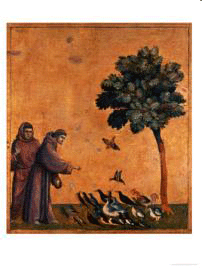 St. Francis of Assisi (1181-1226)
St. Francis of Assisi (1181-1226)
took seriously the virtue of humility, not only for the individual, but for human kind as a species. For Francis, the ant is no longer simply a lesson for the lazy but ‘brother ant’, praising the creator in its own way just as humans do.
The Mystics
Fyodor Dostoyevsky, in The Brothers Karamazov, Book VI ch.2, part G:
‘Love all of God’s creation, the whole and every grain of sand in it.
Love every leaf, every ray of God’s light.
Love the animals, love the plants, love everything.
If you love everything, you will perceive the divine mystery in things.’
Towards a God’s-eye view of the natural world
John 1:3-4
•3 All things came into being through him, and without him not one thing came into being. What has come into being 4 in him was life, and the life was the light of all people.
What should we do?
In 2010 there was a World Mission conference – arguably the most ecumenical Christian gathering ever – held in Edinburgh to mark the centenary of the World Missionary Conference in 1910. A shared mission statement — ‘Common call’ – came out of the 2010 conference. It has nine paragraphs, and the third paragraph prioritises creation:
•Knowing the Holy Spirit who blows over the world at will, reconnecting creation and bringing authentic life, we are called to become communities of compassion and healing, where young people are actively participating in mission [= God’s mission of restoring life], and women and men share power and responsibilities fairly, where there is a new zeal for justice, peace and the protection of the environment, and renewed liturgy reflecting the beauties of the Creator and creation.


